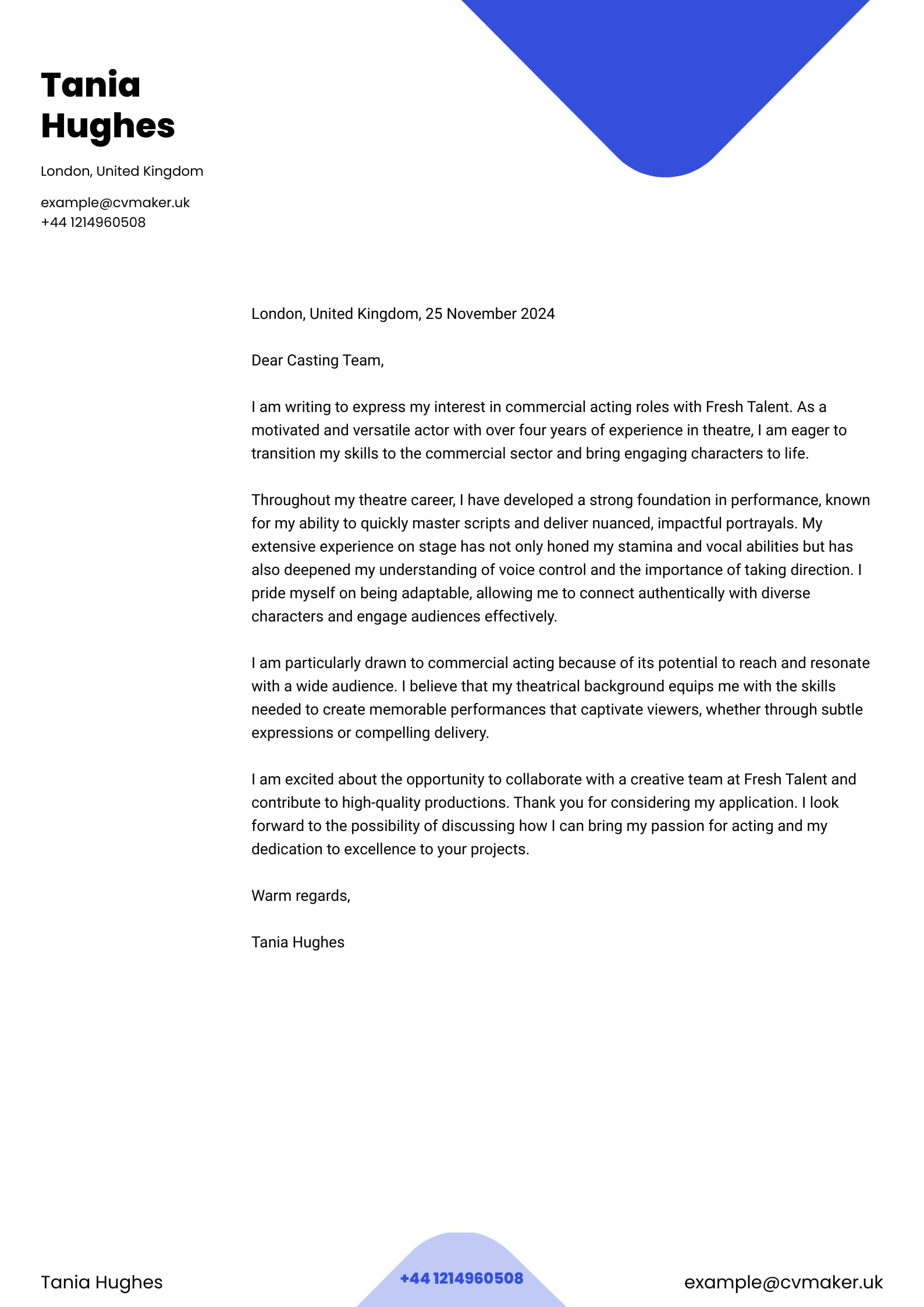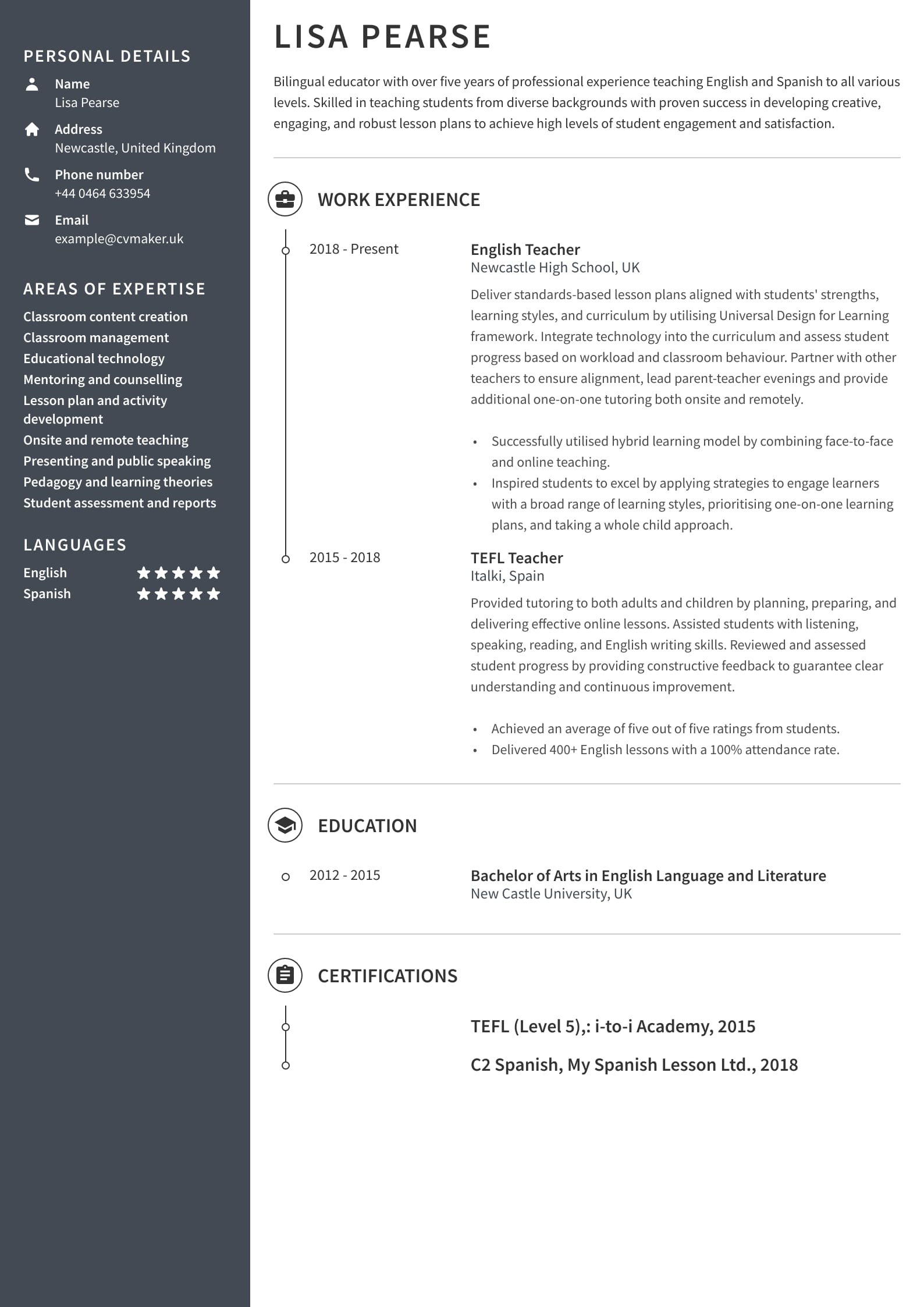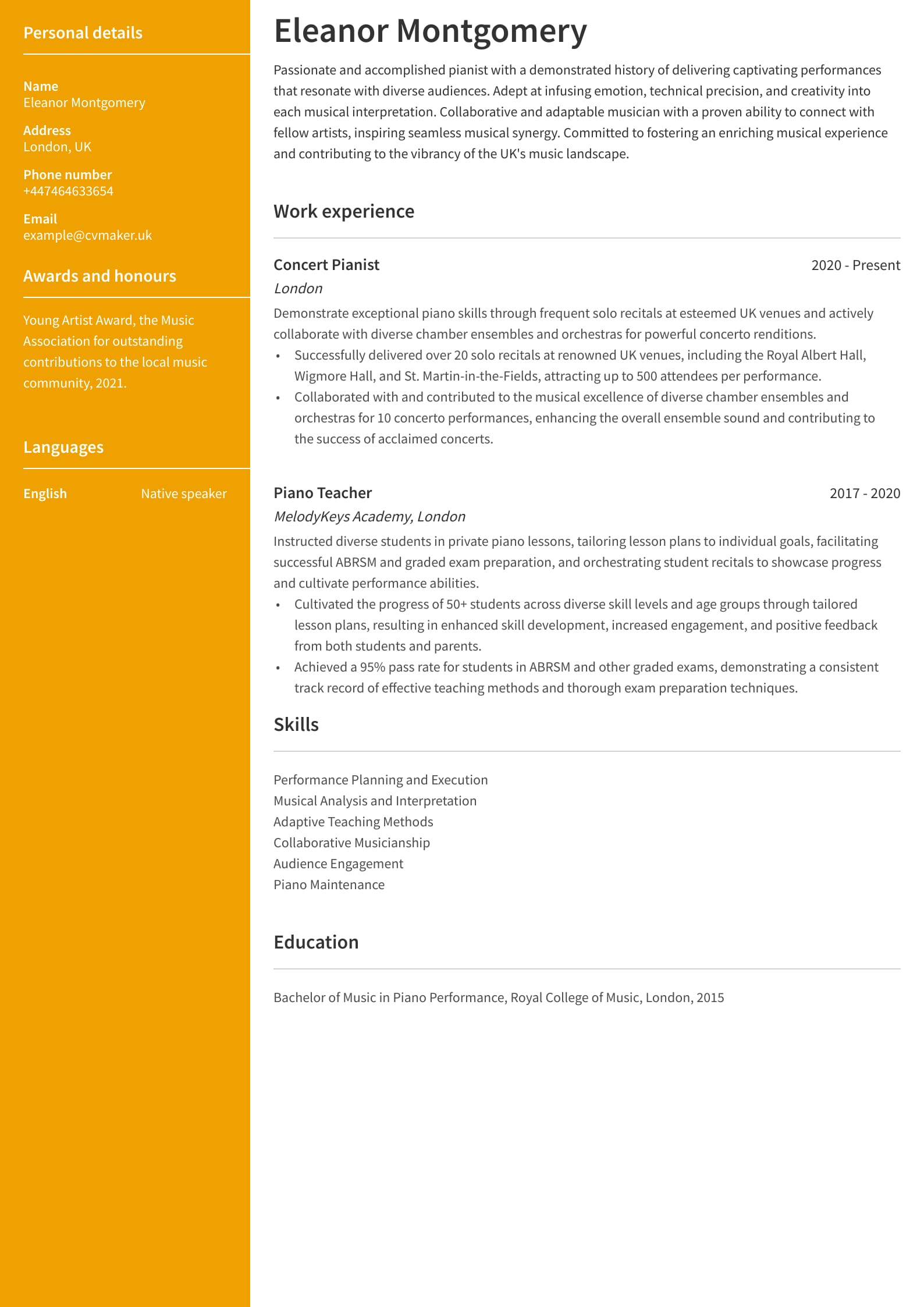
How to Write an Actor CV
With creativity, motivation, and strong communication, you’re well-suited for an acting career. In the competitive industry, impress employers with a good CV that highlights your ability to collaborate, follow directions, and bring characters to life through script analysis and memorisation.
Whether you're an aspiring actor or an experienced performer, your CV is your chance to make a lasting impression. Like preparing for a role, it requires attention to detail, enthusiasm, and skill refinement. This guide will help you write a modern CV that showcases your education, skills, strengths, and acting experience.
Enhance your professional career documents with CVMaker, the ultimate CV and cover letter builder with professional CV templates that can be tailored to your needs.

Acting CV example
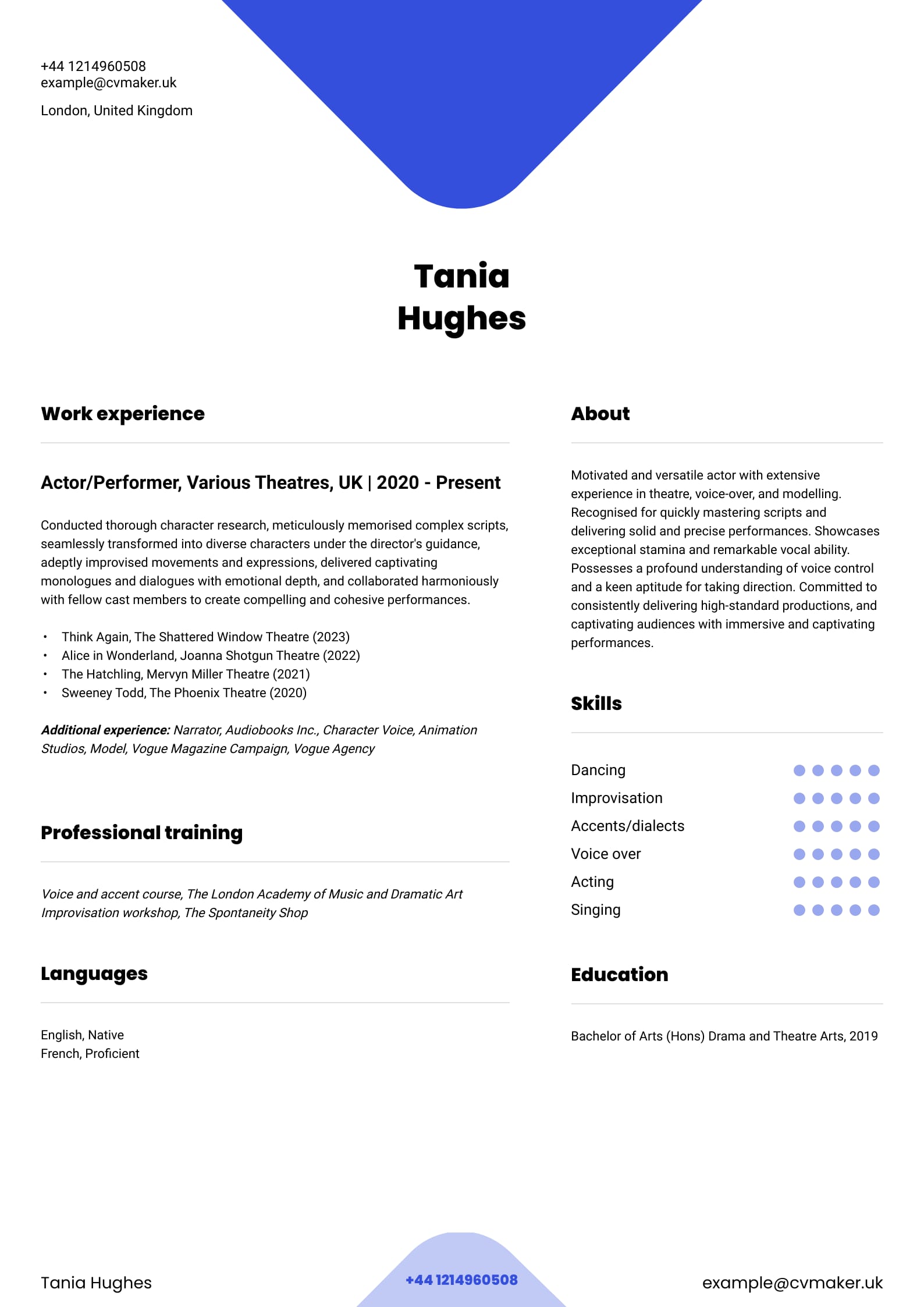
Download this acting CV sample
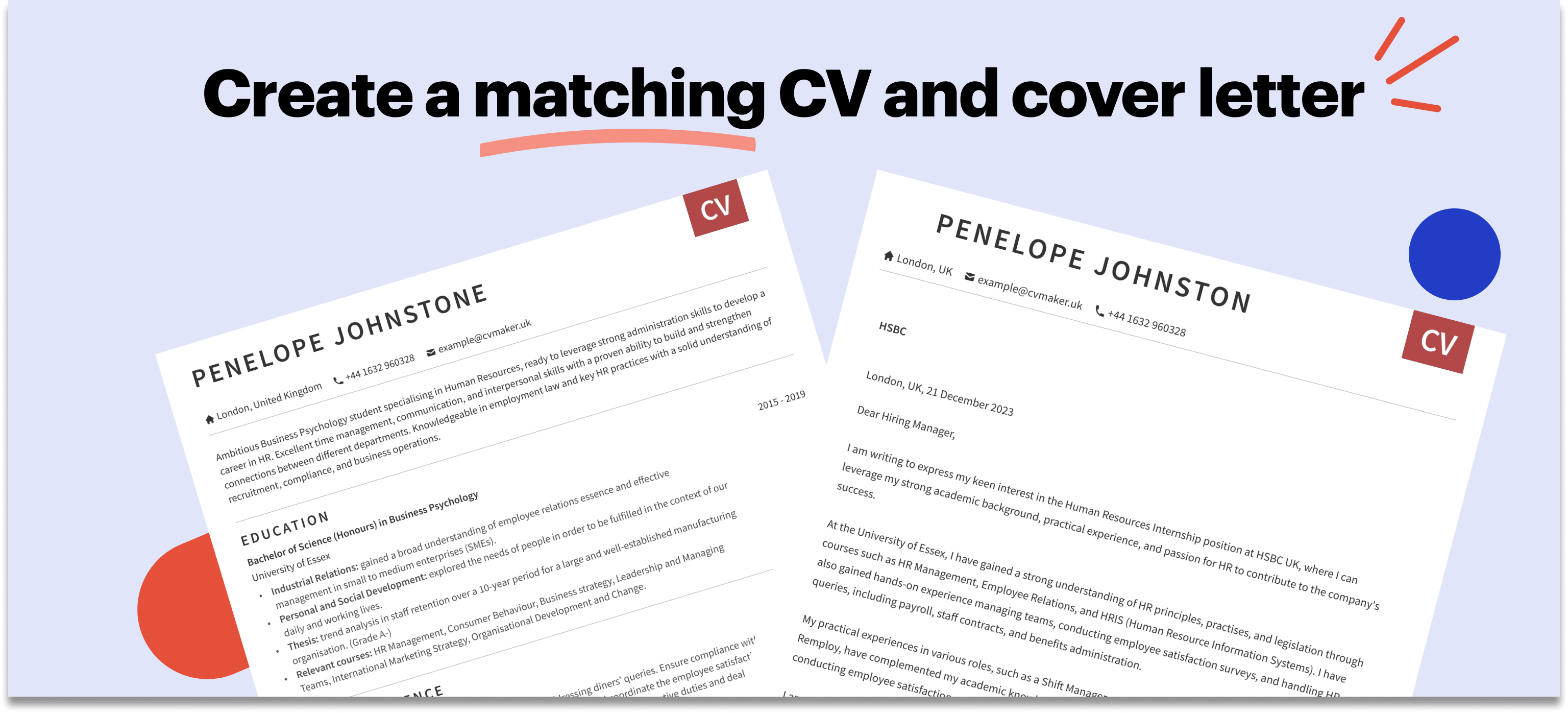
Check out the matching actor cover letter example!
What to include in an acting CV?
Whether you’re an actor, performer, casting director, or drama graduate, this step-by-step guide is for you. Even if you’re looking for a CV for your first job, we’ve got you covered.
Creating a CV for acting can feel as daunting as your first audition. But with the right guidance, you can confidently highlight your experience, skills, and achievements. Use a chronological CV format for your CV with these key sections:
Personal Details: Include contact information. Don't forget to include an up-to-date headshot on your CV.
Physical attributes: Height, hair colour, eye colour, age range, and any other physical attributes.
Spotlight pin: If applicable.
Personal Profile: Showcase your passion, skills, and what sets you apart.
Work History or Acting Credits: List relevant acting or theatre experience.
Education: Include formal training and acting school details.
Skills: Highlight relevant acting expertise.
Awards or accolades: If you've received any awards for your previous roles, don't forget to list them in your CV.
Pro Tip
Include links to your social media, showreels, and actor portfolio to boost your profile.
Once your CV is ready, explore job opportunities on platforms like Mandy or Spotlight.

To kickstart the CV writing process, we recommend creating a master CV that encompasses your actor portfolio samples, credits, training, qualifications, and achievements. This comprehensive document will be the foundation for tailoring your CV to specific roles and applications.
For additional insights into creative performance and arts, refer to relatable examples for a CV in the film industry or performance, such as musician, dancer, designer and artist CV examples.
How to write an actor CV in 5 steps
Whether you're creating an actor CV, performer CV, drama CV, or something similar, this guide will set you up for success and increase your chances of landing more auditions. The key to an effective CV is starting with a master CV and then tailoring each section to align with the specific job you’re applying for.
1. Acting personal profile
Your personal profile serves as a unique introduction, drawing the interest of casting directors to want to learn more about you. It should provide a glimpse into your passion for arts and performance. Blend soft skills with your specific experiences in this section. Mention exceptional communication skills, collaborating with diverse teams, navigating challenging scenarios with creative problem-solving, and demonstrating adaptability in transitioning between roles.

Acting CV for beginners example
Passionate and motivated beginner actor, eager to explore and develop a career in the performing arts. Recently completed acting workshops and have gained hands-on experience in scene work, improvisation, and character exploration. Strong communicator with the ability to bring energy, focus, and authenticity to each role. Able to work collaboratively with directors and fellow actors in both group and individual settings.
Acting CV with no experience example
Dedicated and enthusiastic individual with a deep passion for acting, currently looking to gain experience in the entertainment industry. While new to professional acting, I bring a strong work ethic, creativity, and a commitment to learning. Participated in local community theatre and drama classes, honing my understanding of character development, physicality, and emotional expression.
Refer to our graduate CV example for more insights.
Theatre actor CV example
Experienced Theatre Actor with 3 years of experience in the theatre and entertainment industry. Versatile and adaptable, with expertise in stage, film, and television productions. Demonstrates exceptional command over voice, movement, and character development. Collaborative and professional, able to work effectively with directors, cast members, and production teams.
Voice actor CV example
Dedicated Voice Actor with over seven years of experience in the film and audiobook industry. Expert at collaborating with cross-functional teams to create high-quality media content. Adept at bringing diverse characters to life through powerful voice-over work. Achievements include being the voice talent for award-winning audiobooks and collaborating on a critically acclaimed animated film.
Background actor CV example
Highly adaptable and reliable Background Actor with 5 years of experience. Have a keen eye for detail and a strong ability to bring scenes to life. Demonstrates excellent understanding of character development and can adapt to various roles and environments. Skilled at following directions and maintaining consistency throughout multiple takes.
Learn more about how to write an effective personal profile on a CV that aligns with your career goals.
2. Include acting skills
Being a successful actor is more than just looking and playing the part. It also requires a versatile skill set and the ability to undertake various tasks such as:
Record sessions efficiently.
Be punctual and attend auditions, fittings, shows or rehearsals on time.
Collaborate closely with production teams like costumes and props or casting directors.
You must be flexible, communicative, and adaptable.
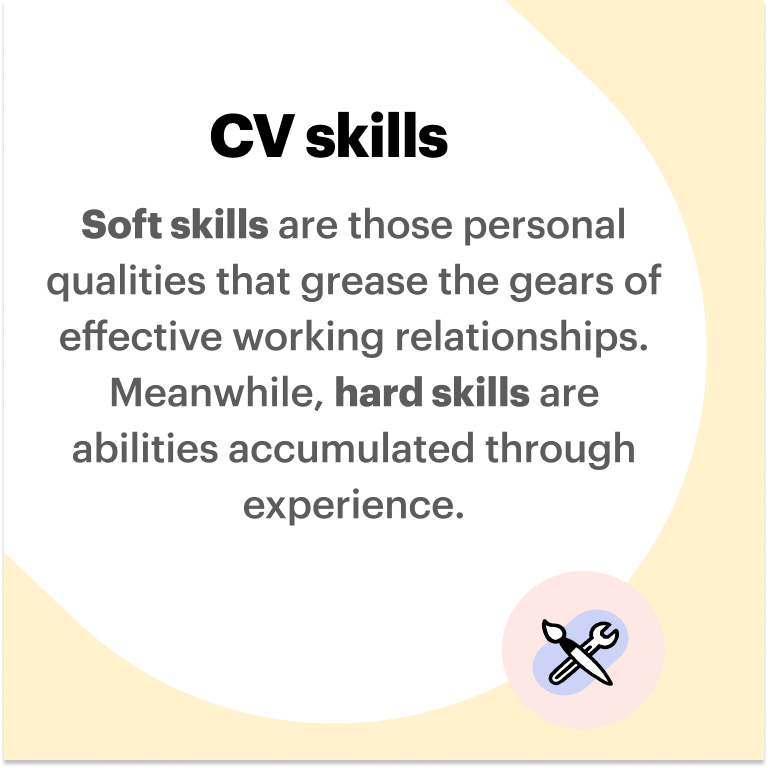
If you have limited work experience or are a recent student, it can be beneficial to highlight your transferable skills. For more tips on presenting the best of your potential, read how to create a skill-based CV.
Refer to these CV examples for more inspiration on creative soft skills for an actor and communication skills to bring ideas to life, such as a beauty therapist, make-up artist, event manager, fashion, and interior designer.
Drama teacher CV
Classroom Management
Curriculum Design
Directing and Coaching
Student Engagement
Performance Critique
For more tips, refer to our teacher CV example or teacher cover letter.
Performance art CV
Physical Expression
Improvisation
Multidisciplinary Creativity
Collaboration
Audience Interaction
Drama CV
Character Development
Scene Work
Emotional Expression
Voice Control
Stage Presence
Background actor or extra CV
Adaptability
Non-Verbal Communication
Attention to Detail
Time Management
Professionalism on Set
Voice over actor CV
Vocal Range
Diction and Clarity
Character Voices
Pacing and Timing
Audio Recording Skills.
Pro Tip
We recommend including soft skills in your personal profile and making a separate section for technical and hard skills.
Best skills to add to your acting CV
| Soft skills | Hard skills |
|---|---|
| Creativity | Singing |
| Teamwork | Dancing |
| Interpretation | Improvisation |
| Emotional intelligence | Memory |
| Adaptable | Accents/dialects |
| Versatile | Costume design |
| Communication | Time-management |
| Motivation | Voice and body control |
| Listening | Physical stamina |
| Collaboration | Voice-training |
| Resilience | Script analysis |
| Critical thinking | Stage-craft |
| Decision-making | Technical knowledge |
Discover more about the skills to put on a CV for the role you're auditioning for.
3. Shine a spotlight on relevant work experience
In the work experience section on an acting CV, you should demonstrate the following:
Industry knowledge
Ability to handle various tasks effectively
Understanding of creative and technical processes.

Highlight achievements and responsibilities from previous acting work, past roles, courses, internships, or volunteering. Provide measurable examples of how you have completed tasks, such as:
Managing rehearsal schedules
Collaborating and working with diverse teams
Adapting to different roles
Assisting with the backstage and production process.
Emphasise any accomplishments such as:
Leading roles in complex scenes
Collaborating with directors to improve the production’s success
Interpreting difficult lines
improvising with cast members to create unique performance styles.
For more tips, read how to add work experience to a CV.
Pro Tip
If you're an aspiring actor with limited work experience, then focus on your key strengths and skills instead.
If you're considering writing scripts for stage or television, refer to our writer CV example for inspiration.
Background Actor, Rosewood Productions, London, 2022 - Present
Contribute to producing various television series and films by portraying diverse characters in different settings. Adapt to different roles and directions while maintaining consistency in performances. Collaborate with fellow actors, directors, and production teams to create authentic and engaging scenes.
Recognised by casting managers for reliability and professionalism in consistently meeting call times and production schedules.
Track record of following directions and cues from directors, ensuring seamless integration into the overall production.
Commended for maintaining focus and energy during long shooting hours, contributing to a positive work environment.
Actor/Performer, Various Theatres, UK | 2021 - Present
Perform various roles in stage productions, demonstrating exceptional acting skills, versatility, and commitment to character portrayal. Collaborate closely with directors, fellow actors, and production teams to create versatile performances for different genres and styles. Memorise extensive dialogue and stage directions, showcasing meticulous preparation and attention to detail.
Received recognition for standout performances in leading roles, earning multiple theatre award nominations.
Collaborated with renowned theatre professionals, contributing to the success of highly acclaimed productions.
Developed strong rapport with fellow cast members, fostering a positive and collaborative working environment.
Voice Over Actor, TalentLights Productions, Manchester, 2018 - 2020
Maintained accurate documentation of voice recording sessions, scripts, and project timelines to ensure efficient workflow and timely delivery. Collaborated with clients and production teams to understand project requirements and deliver high-quality voice performances that met their vision. Implemented innovative techniques and approaches to enhance voice acting performances and create captivating character portrayals.
Streamlined voice recording processes, resulting in more efficient project turnaround times.
Contributed to a 20% increase in brand recognition through national television commercial voice-overs.
Implemented effective communication strategies within the voice-acting team, improving collaboration and project outcomes.

Need more inspiration for writing about our previous work experience? Discover further insights on how to list achievements on your CV.
4. Acting education and qualifications
All actors will have different types of training, experiences, and opportunities that contribute to their careers. They often engage in workshops, masterclasses, teaching and networking events to expand their skills and stay updated on industry trends.
To become an actor in the UK, you do not need any specific qualifications. However, formal training and education can significantly enhance your skills and increase your chances of success in the industry. As a result, many actors pursue higher education or specialised training to develop their craft and gain a competitive edge.
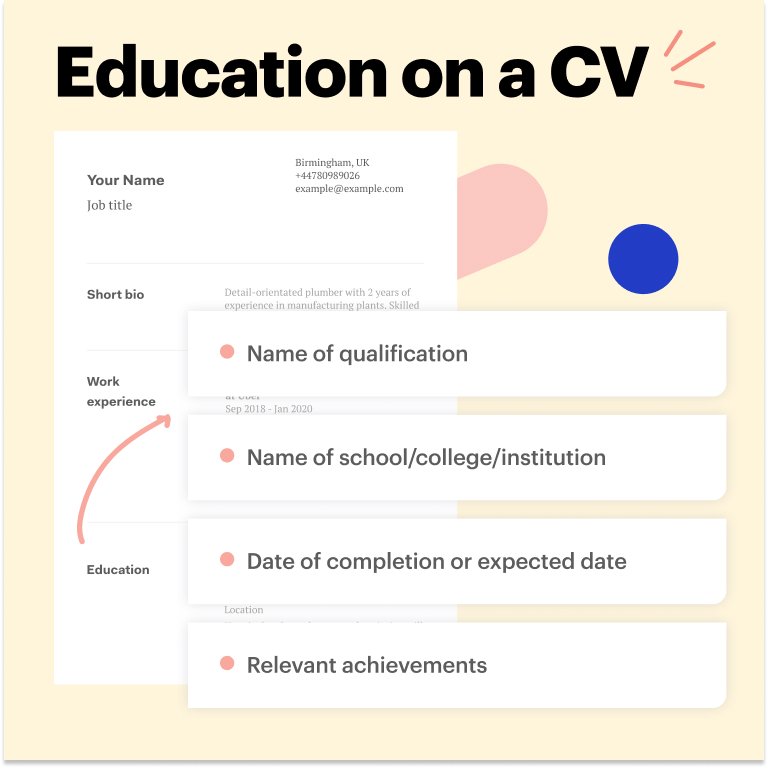
When writing the education section on a CV in the UK, it is important to include certain details about your education. These details include the name and location of your school, the dates you attended, and the degree or certificate you earned. We also suggest researching the specific education requirements and employment opportunities that best align with your career goals. Read more about the diverse roles available in the UK and how to become an actor in the UK.
Some common educational paths for actors in the UK include:
University: Pursue a Foundation Degree, Bachelor's Degree, or Postgrad Diploma in Drama, Performing Arts, Contemporary Theatre, Acting, or Musical Theatre. Usually, a Master's degree will not guarantee an acting role or high earnings after graduating.
College: Courses such as Level 2 Certificate in Performing Arts, Level 3 Extended Diploma in Performing Arts (Acting), Drama & Theatre A Level, Level 4 Diploma in Speech & Drama.
Drama School: Consider taking a course and classes at a drama or acting school. You can also attend conservatories which provide specialised training in acting. These schools often require auditions for admission.
Volunteering: Gain practical experience through volunteering and drama or theatre societies. This can help develop skills and build a network of contacts.
Direct Application: Apply directly for roles or attend open casting calls. This can be more challenging without formal training or experience.
Find an Agent: It is not a strict requirement, but it can help get you further in your career. An agent can assist with your audition schedule, find new opportunities, and negotiate contracts. Agents can also help you establish industry connections through networking to find an acting role.
If you need extra tips, learn more about listing your courses and certificates in your CV here.
Example of how to list education
Bachelor of Arts in Acting, London Drama School, 2021
Relevant modules: Voice and Speech Training, Movement and Physical Theatre, Acting Techniques
A Levels, Brighton College, 2018
Drama and Theatre Studies
Key coursework: Play Analysis, Acting Methods, Theatre Production
GCSEs, St Annes Secondary School, 2016
English Literature, Drama, Mathematics, Art, Film Studies
Additional coursework: Performance Skills, Scriptwriting, Stage-craft
Read more about how to write education on your CV here to highlight your most relevant achievements.
5. Create an ensemble with additional sections
Incorporating additional sections that provide a well-rounded view of your skills and personality. Include volunteer work or hobbies and interests to add depth to your profile and demonstrate your diverse talents.
Consider including references, language proficiency, and links to your social media. By integrating these elements, you create a comprehensive CV tailored for the film industry, aligning with the skills of an actor.
Research how to create an effective online presence using actor websites, actor introduction samples and social media to stand out. Crafting a compelling actor portfolio sample is crucial for showcasing your diverse skills and is a valuable tool to highlight your strengths and achievements to casting directors and industry professionals.
How to write an acting CV with no experience
If you're an aspiring actor with little to no experience, focus on highlighting your key strengths and transferable skills in your acting CV.
Complete relevant courses for additional training and to gain certificates. If you’re a student learning relevant subjects in drama or performance arts, highlight any relevant academic achievements or coursework.
For recent school leavers, we recommend using a skills-based or simple CV which has a clear structure with sections and information relevant to your target job.
If you've worked or have some experience in related fields such as modelling, public speaking, or any other performance-based roles, mention them on your CV. Even seemingly unrelated jobs can provide valuable skills and experiences that are applicable to acting.
Even with no acting experience, a well-crafted CV that uses the additional sections highlighted above can win over potential employers.
Key takeaways
Using a strategic approach to writing your CV will ensure you highlight the best of your potential. An actor's CV layout should showcase training, credits, and special skills, even if you have limited experience in the industry.
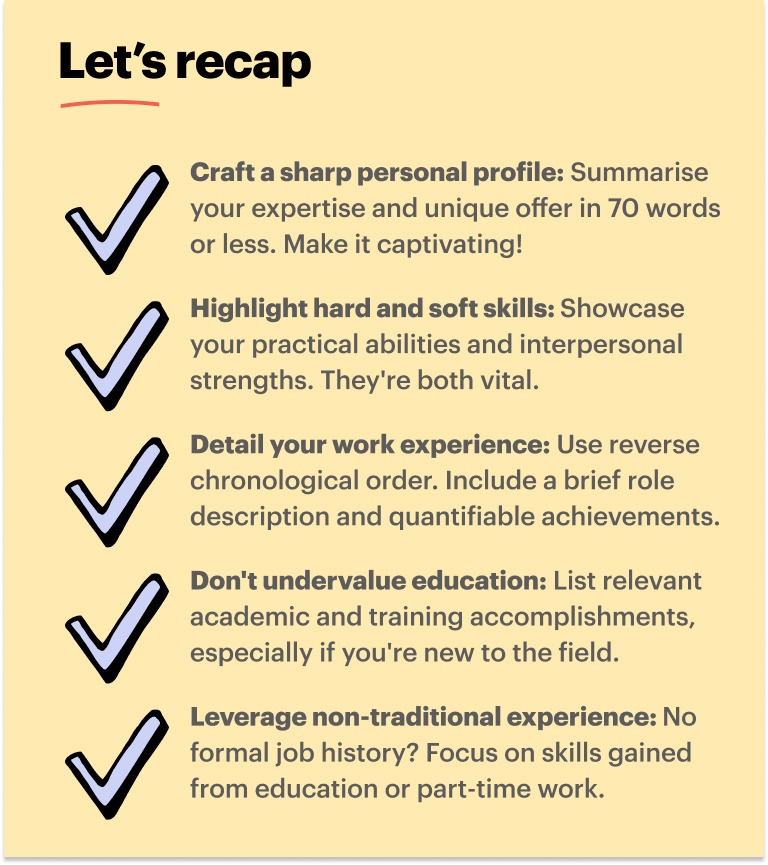
Next steps?
If you need some help, our dedicated CV Writing Service is here to support you to win over industry professionals. Choose from an expertly-designed CV template in our CV maker to ensure your application impresses casting directors. Write a catchy cover letter to impress casting directors and increase your chances of getting more auditions.
FAQs
Do I need an acting CV?
In the UK, a CV is necessary for most roles to get auditions and catch the eye of casting directors. A CV is your professional portfolio, showcasing your experience, training, and skills to industry professionals. Explore our blog for more ideas on how to kickstart your career.
How long should my acting CV be?
In general, your CV should be no more than 1-2 pages. Focus on essential details, and follow the sections highlighted in this CV example guide. Emphasise your recent and relevant work experience, courses and any accomplishments relevant to your job-specific CV. Discover more insights about how long your CV should be.
How should my acting CV look?
Your CV should be concise and well-structured and use a modern and professional design. For more tips, read what is the best font and colour for a CV to impress recruiters.
What should I not include on my acting CV?
To create a concise and professional CV, only include the sections highlighted in this guide. Keep information relevant and focused on the job targets. Avoid unnecessary details about work experience and skills that do not apply to the job description.
What is the best acting CV format?
We recommend to save your CV as a PDF file. PDF format maintains the formatting and appearance of your CV across different devices. In addition, it allows for easy viewing and sharing by casting directors and industry professionals.
How often should I update my acting CV?
Aim to update your CV every few months or whenever you have significant new experiences or achievements to add. This allows casting directors and industry professionals to easily know what you have been up to lately. Include up-to-date contact details like a phone number or email address.
Should my agent look after my acting CV?
While your agent can offer guidance, it's ultimately your responsibility to update and write an actor CV. Collaborate with your agent for assistance, but take ownership of keeping your CV accurate and relevant. You can always ask your agent to read your CV to ensure it's not missing any important details.
Do I need to include a cover letter for an actor application?
Including a cover letter in your CV is optional, but sending one with your job application can be beneficial. A cover letter is optional but lets you introduce yourself, show your strengths, and share your interest in the job. In addition, a tailored cover letter can help you leave a memorable impression on casting directors or agents.
